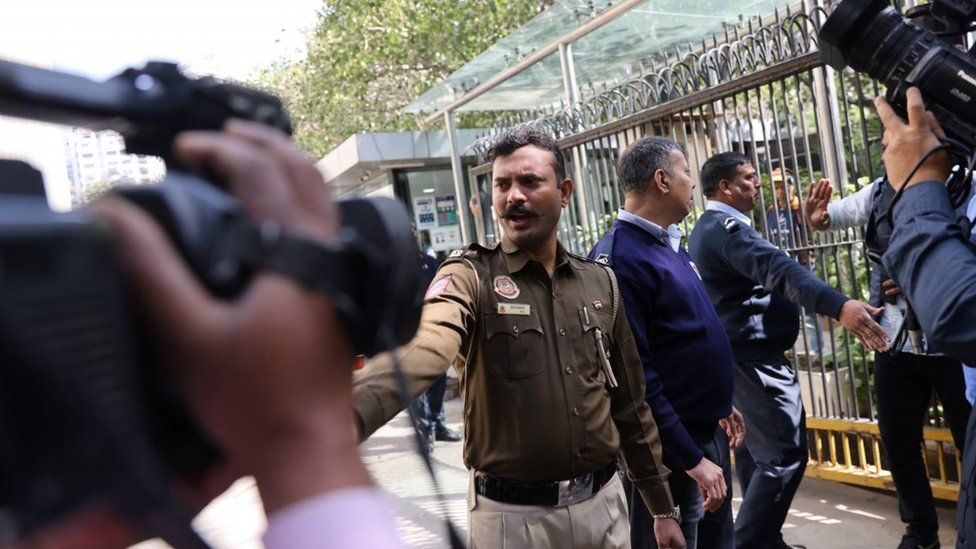The searches come weeks after a documentary in the UK looked at PM Modi’s role in the 2002 riots.
 Image source, Reuters
Image source, ReutersBBC offices in India have been searched as part of an investigation by income tax authorities.
The searches in New Delhi and Mumbai come weeks after the broadcaster aired a documentary in the UK critical of Indian Prime Minister Narendra Modi.
The documentary focused on the prime minister’s role in anti-Muslim violence in Gujarat in 2002, when he was chief minister of the state.
The BBC said that it was “fully cooperating” with authorities.
“We hope to have this situation resolved as soon as possible,” a short statement added.
Although the documentary was only broadcast on television in the UK, India’s government has attempted to block people sharing India: The Modi Question online, calling it “hostile propaganda and anti-India garbage” with a “colonial mind-set”.
Last month, police in Delhi detained students as they gathered to watch the film.
The president of the opposition Congress party, KC Venugopal, said Tuesday’s search “reeks of desperation and shows that the Modi government is scared of criticism”.
“We condemn these intimidation tactics in the harshest terms. This undemocratic and dictatorial attitude cannot go on any longer,” he tweeted.
The documentary tracks Mr Modi’s first steps into politics, including his rise through the ranks of the Bharatiya Janata Party (BJP) to his appointment as chief minister of the western state of Gujarat.
It highlights a previously unpublished report, obtained by the BBC from the UK Foreign Office, which raises questions about Mr Modi’s actions during the religious riots.
The rioting began the day after a train carrying Hindu pilgrims was set on fire, killing dozens. More than 1,000 people, mostly Muslims, died in the subsequent violence.
The Foreign Office report claims that Mr Modi was “directly responsible” for the “climate of impunity” that enabled the violence.
The report was part of an inquiry ordered by the UK’s then-foreign secretary Jack Straw. It says that “the extent of violence was much greater than reported” and “the aim of the riots was to purge Muslims from Hindu areas”.
Mr Modi has long rejected accusations against him, and has not apologised for the riots. In 2013, a Supreme Court panel also said there was insufficient evidence to prosecute him.
The BBC said last month that the Indian government was offered a right to reply to the documentary but it declined.
The broadcaster said the film was “rigorously researched” and “a wide range of voices, witnesses and experts were approached, and we have featured a range of opinions, including responses from people in the BJP”.
This video can not be played
To play this video you need to enable JavaScript in your browser.
UK Prime Minister Rishi Sunak was asked in Parliament last month by MP Imran Hussain if he agreed that Mr Modi was directly responsible for the violence and “what more did the foreign office know of his involvement in this grave act of ethnic cleansing?”
Mr Sunak said “we don’t tolerate persecution anywhere”, but added that “he did not agree with the characterisation” of Mr Modi.
The targeting of organisations seen as critical of the government is not uncommon in India.
In 2020, Amnesty International was forced to halt its India operations, with the group accusing the government of pursuing a “witch-hunt” against human rights organisations.
Oxfam was also searched last year along with other local non-government organisations.